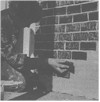SEARCH
Search
explanation
See Also:
What is Perlite?
Hypertufa |
Home > Main Index > Markets >
Construction
Applications > Simulated Stone, Masonry, and Wood Products
Simulated Stone, Masonry, and
Wood Products utilizing Perlite
A unique use for perlite is in the manufacture of fire
resistant, lightweight, rot proof, simulated stone, masonry, and wood products for a
multitude of exterior and interior applications.
Lightweight Perlite Molded Products
 Perlite simulated stone may be molded to give the appearance of brick, stone, or
even wood products. A special advantage of perlite simulated stone is its
lightweight. Perlite simulated stone may be molded to give the appearance of brick, stone, or
even wood products. A special advantage of perlite simulated stone is its
lightweight.
Traditional stone and masonry products are heavy and
require more expensive structural support. With simulated stone products, traditional
framing and supporting materials are usually satisfactory and installation costs can be
reduced.
 A further advantage of
lightweight perlite simulated stone or wood products is reduced shipping costs and ease of
handling. In addition, perlite provides an insulating advantage and is rot, termite, and
fire resistant. Simulated stone and wood products are excellent for hiding irregular wall
surface and may be used in new construction, remodeling, and in exterior and interior
applications, depending upon the binder used. A further advantage of
lightweight perlite simulated stone or wood products is reduced shipping costs and ease of
handling. In addition, perlite provides an insulating advantage and is rot, termite, and
fire resistant. Simulated stone and wood products are excellent for hiding irregular wall
surface and may be used in new construction, remodeling, and in exterior and interior
applications, depending upon the binder used.
Mix Compounds
Perlite concrete and plaster aggregates conforming to ASTM specifications are commonly
used in the manufacture of simulated stone or wood. Binders and other components of
perlite simulated stone usually include Type I or Type III portland cement, gypsum, lime,
clay, and castable or other resins. Other additions may include sand, shale, coloring
agents, silicates, alkaline resistant fiberglass shorts and polypropylene or wood fibers.
Mix Designs
Mix designs for perlite simulated stone products range from 1:4 (binder to perlite) to
1:10 by volume. Mixing is accomplished with ribbon, plaster, or other mixers having low
shear action. Paddle type and size should be chosen for the lowest shear rate.
Stone Product Manufacture
Simulated stone products may be formed by pouring or pressing the molding material into
relief molds, by extruding or vibrating into wood or steel molds or forms, and my die
cutting. Surface finish and configuration of the stone is determined by the mold being
used.
Applications for Perlite Simulated Stone
Among the applications for lightweight perlite simulated stone are wood shakes, exterior
siding, fireplace logs, and masonry block, brick, and stone for exterior and interior
applications.
Perlite also may be used in the manufacture of adhesives, glues, and mortars used to affix
simulated stone to a variety of exterior faces. An advantage of perlite in these
applications is its function as a filler replacing more costly resins or heavier fillers.
|
